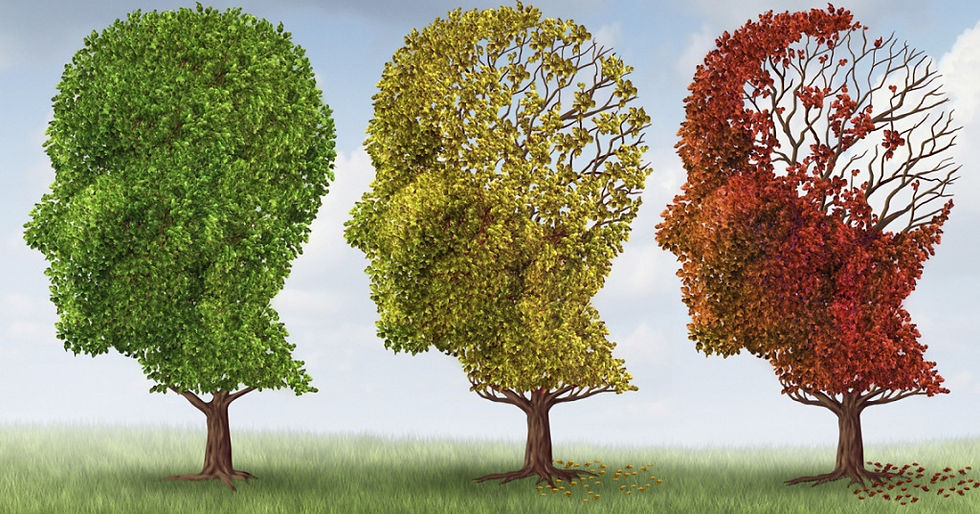What Can Be Done: Today & the Future
- Carl B. Forkner, Ph.D.
- Dec 13, 2018
- 4 min read

The World Health Organization (WHO) has estimated that there are over 45 million people in the world suffering from dementia--a number that has been reported as high as 70 million by other sources. One of the concerns with these figures is that many of these people are not diagnosed with dementia or misdiagnosed with another malady. It is also estimated that as many as 1 out of every 3 children born today are at risk--or will be at risk--for dementia! Just imagine nearly 1/3 of the population in 2100 having some form of dementia...
Fortunately, these numbers are static estimates; they do not take into account ongoing research efforts to identify causes, treatments, and potential cures for these life-stealing diseases. There an important byproduct of these efforts--this is truly an international push to find the causes, treatments, and cures for dementia that serves to bring together the international scientific community. This article will focus on some of the areas of important research being accomplished globally, finishing with thoughts on the way ahead.
Research
In the United States, a national plan for addressing the growing health issue of dementia was announced. This plan is based on the 2011 National Alzheimer's Project (NAPA) that set a goal of 2025 for having effective treatments and preventative measures for dementia. These goals are being addressed through research led by the National Institute of Neurological Disorders and Stroke (NINDS) and the National Institute on Aging (NIA), both of which are components of the National Institute for Health (NIH).
OK, so, had enough acronyms for one paragraph? Let's move along and explore some of these research areas.
Clinical Studies provide a way for researchers to model and discover the effectiveness of methods to detect, treat, and prevent dementia.
Drugs provide one option for exploring through clinical studies. There are numerous pharmaceutical therapies being tested now, from lab animal tests to human clinical trials.
Fitness is one of the complementary regimens being studied in conjunction with various drugs and other therapies in addressing cognitive decline.
Genetics is a field that has developed almost exponentially during the last decade. This is important research both from the congenital possibility of acquiring dementia--or greater risk for dementia--and finding the etiologies of non-congenital dementia.
Imaging has developed increasingly detailed and customization for examining brain, nervous system, and other body areas to provide detailed insights into the physical changes that accompany or cause dementia. These advanced imaging platforms and techniques also provide data into the effectiveness of treatment regimens on slowing, stopping--and someday reversing and curing--dementia.
Proteins are a common denominator among a number of dementia forms. The challenge for research is determining their origin, migration, and build-up that affect the brain and nervous system. Much research is being done on the affects once these proteins begin effecting cognitive or motor decline, but the beginning chapter is still unwritten and must be discovered in order to effectively develop preventative methods.
Sleep is being explored as a contributing factor to dementia, both in exacerbating an already present condition and in putting the individual at higher risk to develop dementia. This is one reason why sleep apnea patients need to prioritize using their CPAP therapy daily...
Stem Cell research is critical to explore how proteins genetically mutate or "fold over" incorrectly on nerve cells in order to develop effective drug and other therapeutic treatments.
Awareness
As mentioned in the beginning of this article, it is estimated that millions of people have the beginning stages of dementia but are, as yet, undiagnosed. Hence, awareness is a big part of the battle against these life-stealing conditions--an effort that I am happy to support through Dementia Friendly Tempe (AZ). But, with the information technology age where information is so freely available, how can people not understand what their symptoms are telling them?
Unfortunately, many people mistake dementia symptoms as simply being a normal part of growing old. Yes, we tend to have small issues with memory sometimes as we enter our golden years (OK, so 65+), but when symptoms progressively worsen, that is not a normal part of aging. But again, how does one know the difference? Simply put, awareness seminars like the ones offered by Dementia Friendly [your city or state here] provide free, one-hour awareness seminars to the community. These may be open opportunities or arranged by a specific organization or neighborhood to bring awareness to people. The seminars also provide information on ways to find diagnostic and treatment professionals in the area that may answer more in-depth, patient-focused questions or concerns, along with formal diagnosis and treatment.
In Closing...
Dementia has been referred to as the leading global health crisis of our time and threatens to severely impact social, business, and economic security in the next 30 years. Effortsby international researchers, medical, and neuropsychological professionals have grown to address this impending global human crisis. but it does not start and end with scientists--the more awareness that people and families have about the characteristics and symptoms of dementia, choices about healthcare, lifestyle, planning ahead when a loved one is diagnosed, and understanding the support available in the community, the better our chances of turning back this impending global human crisis.
Lists in this article adapted from Earlstein, F. (2016). Dementia Facts & Information. NRB Publishing: Nevada.
For more resources and references on Dementia topics, see the following:
Dementia & Memory News & Research: https://www.drcarlforkner.com/dementia-memory-news






Comments